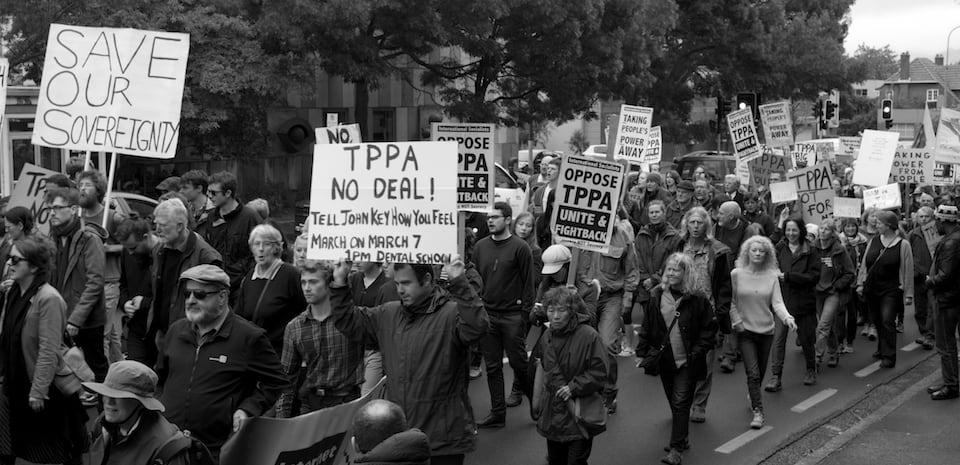[dropcap]S[/dropcap]tudents often adopt anti-capitalist views. This is reasonable, considering we do not yet have a stake in the system, and corporations rarely share our values. However, this is no reason to reject all that is related to capitalism and the wholesale free market. Doing so only stifles necessary debate, and inadvertently put our at risk.
In a recent article in The Varsity, Malone Mullin criticized the upcoming ratification of the Trans-Pacific Partnership (TPP). By immediately seeing investor-state dispute settlement (ISDS) through the lens of a struggle of the powerless masses against multinationals, the author fails to grasp the subtleties of this debate; there is a lack of recognition that the TPP is largely beneficial to all of us.
Investor-state disputes arise when a state changes its laws or nationalizes assets that previously belonged to foreign corporations. Trade deals often include clauses that provide for such cases to be heard in international arbitration tribunes. To call such arbitration procedures “thinly veiled extortion” is an unfair claim against the multinationals and against ISDS.
Take, for example, the Exxon and Venezuela case. Last year, Venezuela was ordered to pay $1.6 billion for nationalizing Exxon’s Cerro Negro project in 2007. On the surface,this may seem like a case of capitalism run amok, but in fact, even Venezuelan officials called the outcome a triumph. After all, the facilities had cost Exxon $3.1 billion to build and run, and were probably worth a lot more than the compensation awarded. Without ISDS, it would have been difficult for Exxon to obtain fair compensation.
[pullquote]The TPP may in fact turn out to be crucial to ensuring a better future.[/pullquote]
The point is that there is often a fair and legitimate use for ISDS. The fact that multinationals sometimes abuse the system is certainly no reason to get rid of such procedures altogether. Rather, it is a call for limitations on the use of ISDS. There are many such limitations in the TPP; for instance, TPP explicitly excludes the use of ISDS by tobacco companies who have previously used it as an intimidation tactic against government trying to protect public health.
In any case, neither ISDS, nor free trade for that matter, is the main goal of TPP. TPP’s real promise lies in the liberation of trade in services. This is, without a doubt, beneficial to the future of most Canadians, and especially so for students.
Currently, 76 per cent of the Canadian population is employed in the service sector, but international trade in services is miniscule in comparison. Services like haircuts are obviously difficult to export, yet with improvements in information technology, services in finance, engineering, education, and health care are becoming increasingly exportable.
For example, hospitals in the future could outsource patient monitoring to nurses in Malaysia, or diagnostics to technicians in India, thereby reducing their provisional costs. Similarly, Canadian doctors in the future could give video-conference consultations to patients in Mexico, who may not otherwise have access to specialized medical expertise.
Right now, regulatory barriers are preventing this type of beneficial exportation from happening. In many countries, before foreign companies can start supplying a service, they are required to build local data centers, show software source codes to government officials, or establish joint-venture or local offices. The TPP bans these requirements, and many others, in order to encourage international trade in services.
As students, we belong to a globally connected future. Many of us are studying to one day become bankers, lawyers, engineers, doctors, or consultants. These are all professions that will be changed by the TPP 10 years down the road. The liberation of trade in services that the TPP promises will expand our horizons and allow us to offer our services in foreign markets with ease. As future consumers, we will also benefit from the lower prices in health care and financial services brought about by increased global competition.
Many will undoubtedly raise the objection that more trade liberalization will lead to job losses. Just as in the case of ISDS, this is a valid concern, but far from a knock-down argument. Previous trade policies offer many examples of instances when job protections are not worth it when accounting for the harm to consumers. For instance, the Japanese car import quotas in the 1990s cost US consumers $6.5 billion, or $250,000 per job saved.
Free market initiatives like TPP often provoke reflexive scorn from students. This is a mistake, and does not move the debate anywhere. The TPP may in fact turn out to be crucial to ensuring a better future.
Li Pan is a fourth-year student at Trinity College studying economics and mathematics.


